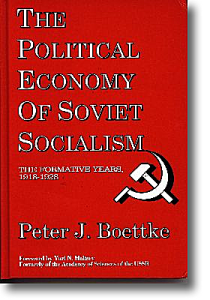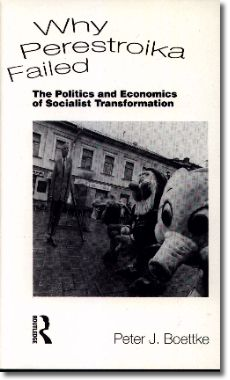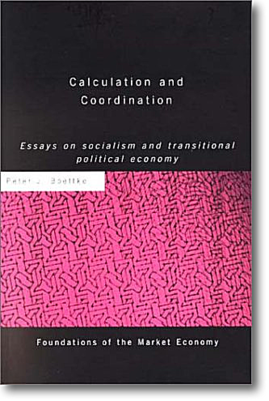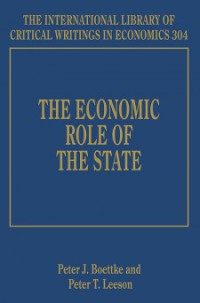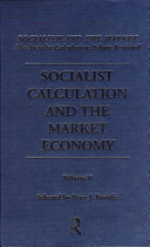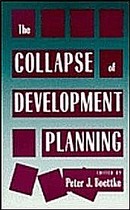“[M]y original studies in economics were in the economics history of the founding of the “Soviet Union: The Political Economy of Soviet Socialism,” and this was followed up by “Why Perestroika Failed.” A collection of my studies was later published as “Calculation and Coordination.” In my work on the failure of the Soviet system, I blend the economic calculation argument of Mises with the dispersed knowledge argument of Hayek and the logic of political decision-making from Buchanan and Gordon Tullock to explain the perverse consequences of socialism in practice.
The socialist experiment resulted in economic deprivation and political tyranny, not due to any accidents of history, but because of pursuing an economic policy regime that cannot work. However, laying bare the internal contradictions of socialism and the corruption of the system that filled in its place is one thing; laying out how to transition from that system to a functioning market economy is quite another. Like many other economists in the late 1980s and throughout the 1990s, this question preoccupied my scholarly endeavors.”
Books
Reviews and commentary
The Political Economy of Soviet Socialism: The Formative Years, 1918-1928
“You will never get a better scholarly book on the Soviet economy than the one Boettke offers.”
“This study on the history of Soviet economic thought during the first years after the Bolshevik revolution of 1917 is much more than the regular academic scribble on this turbulent period of modern history. It is a systematic treatise on economic theory. Interdisciplinary in nature, it discusses the central problems of political economy and provides the serious reader with deep insight and complete understanding of the greatest event of the twentieth century: the rise and fall of communism.”
“The author’s contribution is to bring the powerful insights of Austrian economics, most notably those of Mises and Hayek, to bear on the interpretation and explanation of the failure of Soviet-type political and economic systems to meet the aspirations of their peoples. That spectacular failure does indeed show that Mises was right about the dismal fate that awaits societies that attempt to replace markets and private property with central planning and state property.”
“Peter Boettke has written what must now be the major introduction to the ideas animating Communist economies.”
“...a perceptive...libertarian analysis of the genesis of the Soviet economy. ”
“It is obvious that great historical movements are rarely able to follow the inner logic of their ideologies, that they have to respond to the exigencies of the changing situation and consequently change themselves, sometimes losing their original identity completely... But all this does not undermine the legitimacy of interpreting the Bolshevik experiment in direct transition of communism as the culminating phase in the history of Marx’s communists utopia. From this point of view (i.e., from the point of view of intellectual history) the first three years of Soviet power (1918-1921) essentially constitute one period: the period (to quote Lenin) of “a direct transition from the old Russian economy to state production and distribution on communist lines,” of “attempting to go over straight to communism.” .... The merit of stating it clearly belongs to Boettke.”
“Peter Boettke’s analysis — the first comprehensive work by a follower of Mises and Hayek — introduces a bombshell into this [Soviet history] debate. His analysis stands the traditional interpretation on its head: war communism was not a twisted aberration imposed on the bolsheviks by events, but the result of a correct understanding and application of Marxian doctrines and an attempt of realize them in practice.... the Political Economy of Soviet Socialism is a brilliant vindication of Ludwig von Mises’s analysis of capitalism and market process.... The Political Economy of Soviet Socialism is important to the battles going on today in the world. It should be translated into as many Soviet and East European languages as possible. It should be heralded as a major breakthrough in economic and historical analysis, the culmination of the work begun by the great Ludwig von Mises back in 1920.”
Why Perestroika Failed: The Politics and Economics of Socialist Transformation
“Peter Boettke’s book is one of the few in which an economist deploys his own disciplines in that fuller context [to address the structural problems of the Soviet system].”
“This is a well-written and occasionally polemical analysis of what was wrong with Marx’s vision of socialism and with its “Soviet” version, and of the attempts to reform the system, plus some guidelines as to how to achieve a rapid transition to capitalism... Many times Boettke hits his target with precise effect. Thus he correctly stresses the utopian elements in Marx’s vision of socialism, the irrationalities and distortions typical of the traditional Soviet system, as well as the contradictions which accompanied the attempts to reform it under Gorbachev.”
“Within the recent wave of reflections on perestroika Boettke’s book is among those with the highest theoretical ambitions.... The book is inspired by the Hume-Hayek tradition , which is extremely well applied in the explanations of the structural weaknesses perestroika failed to overcome. Perestroika did not bring changes in institutional rules which would allow experiments in social organization that are seen as a basic requirements of any sustainable economic system.... Whether you agree or disagree with the arguments the book gives an excellent and consistent view on the topic.”
“Peter Boettke’s “Why Perestroika Failed” is an ambitious book that succeeds in its effort to demonstrate the inevitability of the failure of Soviet economic reform in the Gorbachev era. This is not what is most interesting about the book, however, as other authors have already been over this ground. Instead, “Why Perestroika Failed” represents an important contribution to the literature on the (post) Soviet-type economies in two respects. First, Boettke analyzes the Soviet system, perestroika, its collapse and the post-communist transition from an unabashedly public-choice theory to a Soviet-type economy and a subsequent transition to capitalism, it does represent the most recent and comprehensive undertaking in this regard. Second, Boettke’s book also constitutes a provocative integration of public choice theory, sovietology, history of economic thought and Russian economic historiography, with attendant implications for the post-communist economic transition. this is the most important contribution of “Why Perestroika Failed”... those who are interested in updating the von Mises/Hayek critique of socialism, mixing it with the Buchanan/Tullock logic of public choice, and extending the synthesis to the collapse of the Soviet system and the subsequent post-communist transitions, are likely to find “Why Perestroika Failed” fascinating.”
Calculation and Coordination: Essays on Socialism and Transitional Political Economy
“Boettke’s provocative reinterpretation of the Soviet and transition periods, particularly his reinterpretation of the Soviet period, is based largely on theoretical foundations, due to the extreme secrecy of the Soviet period. He provides interesting hypotheses about the Soviet economy being a rent seeking rather than a planned economy—that can eventually be tested against real-world Soviet data as they emerge. The application of modern political economy to explain the problems of transition has brought together the ‘old’ and ‘new’ economic specialists on the former Soviet Union. I am particularly pleased that Boettke, unlike others, has taken the time to examine the Soviet past and in particular question the stereotypes of the Soviet administrative-command economy that Soviet specialists have been too willing to accept.”
Journal Articles
“Lessons on Economics and Political Economy from the Soviet Tragedy,” Journal of Global Initiatives, 2017, vol. 12, no. 1, pp. 23-47.
“Entry and Entrepreneurship: The Case of Post-Communist Russia,” (with Bridget Butkevich), Journal des Economistes et des Etudes Humaines, 2001, vol. 11, no.1, pp. 91-114.
“The Russian Crisis: Perils and Prospects for Post-Soviet Transition,” American Journal of Economics & Sociology, 1999, vol. 58, no. 3, pp. 371-384.
“Promises Made and Promises Broken in the Russian Transition,” Constitutional Political Economy, 1998, vol. 9, no. 2, pp. 127-136.
"Soviet Venality: A Rent-Seeking Model of the Communist State," (with Gary Anderson) Public Choice, 1997, vol. 93, nos. 1-2, pp. 37-53.
"Credibility, the Monetary Regime, and Economic Reform in the Soviet Union," Cato Journal, 1993, Vol. 12, No. 3, pp. 577-584. Reprinted in James Dorn and Roustem Noureev, eds., Monetary Reform in the PostCommunist Countries, Moscow: Catallaxy Press, 1995, pp. 64-72. [In Russian].
"Perestroika and Public Choice: The Economics of Autocratic Succession in a Rent-Seeking Society," (with Gary Anderson), Public Choice, 1993, vol. 75, no. 2, pp. 101-118.
“The Political Economy of Utopia: Communism in Soviet Russia, 1918-1921,” Journal des Economistes et des Etudes Humaines, 1990, vol. 1, no. 2, pp. 91-138.
“The Political and Economic Challenges of Perestroika,” Market Process, 1990, vol. 8, pp.19-35.
"The Soviet Experiment with Pure Communism," Critical Review, 1988, vol. 2, no. 4, pp. 149-182.
Hayek Program Podcast
Video
On this episode of Free to Exchange, Ben Powell speaks with Dr. Peter Boettke about the economic systems of the former Soviet Union and Easter Block countries.
Dr. Peter Boettke (George Mason University and a board member at FEE) discusses what we have learned from the collapse of communism and the transition away from that system. Filmed at the 2011 FEE Advanced Austrian Economics seminar in Irvington, NY.

